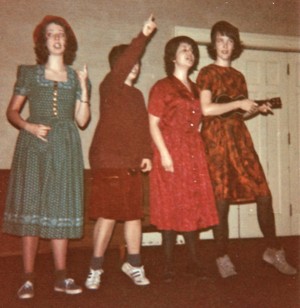It was a six Xanax quarter with the OK Chorale. They always pull it off in the end but three pieces made me wonder if this was the quarter when we would break our streak:
I didn’t know much about Abba. My popular music education stopped in 1972. (See https://www.elenalouiserichmond.com/2011/03/piano-students-part-2-the-adolescents/ ) Then one of my students who had me in a stupor with Taylor Swift music, brought in the score of Mamma Mia. I came out of my coma to ask Chris, the unclassifiable, except that she did surveillance on Russian spies when she was in the army, if she had any Abba in her collection. I was attracted to the possibility of the OK Chorale singing “Take a Chance on Me.”
I decided of my own free will to arrange this repetitive piece of music. That meant writing “take a chance, take a chance, take, * chance chance” fifteen (15) times for the tenor and bass parts. That ostinato was the first thing to start waking me up at three in the morning. That and the cramp in my hand.
I tarted up a little transitional bit with a classical music sequence which didn’t work as well with real people as it had in my head. We went over and over it. Individually the parts were not difficult but together, everyone sang like they weren’t sure what they were doing.
I said, “Look, it’s the fault of the arranger; it’s not very well written, so please just sing loud.” Then it worked. They made it sound well written.
Every week my friend Nina (rhymes with Dinah) reminded me that there were rests in “Take a Chance on Me” that when observed, made all the difference to the disco feel to the rhythm. Every week. Every week we carved a little more sound out of the general areas where there were rests. Nina is still my friend.
“Why don’t we have Gail’s kindergartners make us a paper maché disco ball like they did the boar’s head?” someone asked. “Then no one will notice the rests one way or another.” (https://www.elenalouiserichmond.com/2010/12/a-boars-head-in-the-hand/)
“No.” said Gail flatly.
“Juramento” is one of the hardest pieces the Chorale has ever attempted. I fell in love with the sound of this lush and beautiful Cuban song with the grotesque translation, and told the Chorale it was worth the price of the whole quarter. It was undoubtedly a difficult arrangement and singing in Spanish was a challenge. The score had been published in Cuba and was hard to read.
There was almost a mutiny in the tenor section.
“I can’t read this tenor part. Why is that stem going down?” Jean, who is usually ironic, wasn’t.
“There’s no relationship with the bass part,” Hal declared. “There’s nothing to anchor us!” Hal only ever says funny things. Here he was, almost rising up with a saber. Maybe the presence of Chris who used to do surveillance on Russian spies prevented a coup, but eventually the tenors were pacified.
Don, baritone, found a web site where the arrangement was parsed out in midi-files so everyone could listen to their own part in that boopy-doopy midi sound. Evidently we weren’t the first choir to need the help. Everyone loved the midi-files.
No one raved so much about how helpful I was. When I get busy trying to play all the parts and the accompaniment at the same time, I make all kinds of mistakes. I wonder if everyone realizes this and is too polite to say so. No, that doesn’t sound like the Chorale. They probably suffer from some variant of Stockholm syndrome.
The Spanish complicated things. We learned it on “la” and “ooh.” I told them to start adding a few of the Spanish words and let them accrue a little at a time as we rehearsed. I figured some people would get them all and some wouldn’t get any and the rest would fall in a continuum. This has always been my policy when we sing in Latin and I think it’s a fine one for relieving pressure.
Eileen, tenor, who is fluent in Spanish, told me fifteen times if she told me once that the title was pronounced “Hooramento” not “Yooramento.” Driving home from the last rehearsal, I finally heard her. “Oh,” I thought. “I keep calling it Yooramento and she keeps putting her face six inches from mine, saying slowly and patiently, ‘It’s Hoo, Hoo, Hooramento.’”
My shirt was sticking to my back earlier and earlier in rehearsals. “Hooramento” was supposed to be the only hard song this quarter. But in addition to it and “Take a Chance on Me,” there was “The Birth of the Blues.” I have done this arrangement with a compliant group of women who knew how to count. They bore little resemblance to the Chorale.
The rhythm in “The Birth of the Blues” is difficult if you want it to rock, even pebble, in the slightest. Nearly every entrance is off the beat. But instead of everyone coming in cleanly on the off beat, we got an echo chamber: st st st st start fofof buh buh blues.
We went over and over the entrances. We counted, we clapped. I beat my head on the piano.
Finally I said “Just get this one entrance. This is all I am asking of you.” I picked out my favorite phrase. The rest were on their own.
Rehearsals were disrupted by the snow that never came. Noaa had predicted four inches of snow on a rehearsal evening. When it finally started snowing at 5:00, I learned that four people weren’t coming to rehearsal on the grounds that they didn’t want to risk walking out at 8:30 with two inches of snow on the ground. At the last minute, I cancelled an OK Chorale rehearsal for the first time in 18 years. The snow didn’t stick.
The next rehearsal was abysmal. It was like no one had even seen the music.
The week after the abysmal rehearsal, we were displaced from the church because of an Ash Wednesday service. Shelley, alto, opened her large house with the grand piano and the cat named Zack. That rehearsal went so splendidly that I decided I would invite people to the performance.
“Well, you’ve made music out of a molehill once again” Jean said. Once again she was not being ironic.
The performance last Saturday night was splendid. The Chorale always pulls it off. They observed the rests. They sang loud where directed. They sang in Spanish. They rocked.
 RSS Feed
RSS Feed


